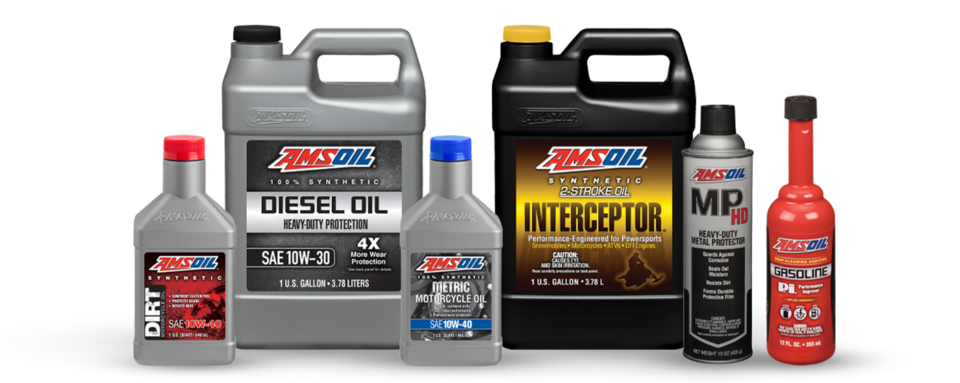AUTHORIZED DEALER
SELECT SYNTHETICS
Richard Rioux
referral # 5256323
(807) 853-0807
OUR BLOG
Temperature extremes can be very hard on a vehicle's engine and detrimental to its longevity and performance. In this post, we will examine how AMSOIL Premium Synthetic Motor Oils can protect your vehicle's engine under these extreme operating conditions.

CLICK POST TITLE TO EXPAND THIS POST
Unlike conventional oil, which is distilled from crude oil, synthetic oil is built in the laboratory. Formulators start with individual molecules, typically ethylene, and build the lubricant from the ground up. This allows formulators to use only pure, uniform molecules beneficial for lubrication.
As a result, synthetic oil provides benefits conventional motor oil simply can't match, including increased wear protection, improved engine cleanliness and maximum fuel economy.
While synthetic oil offers benefits for all vehicles, it's especially beneficial for modern vehicles that use technologies like direct fuel injection, turbochargers, and variable-valve timing to improve fuel economy and reduce emissions. These new technologies increase heat, which can lead to engine, turbo and fuel-injector deposits that reduce performance and shorten life.
Synthetic Motor Oils Are Proven to be More Resilient in Temperature Extremes
Most breakdowns tend to happen when a vehicle's engine gets either too hot or too cold when operating under extreme conditions. This isn't your car engine's fault, but is rather due to a fundamental change in the elemental composition of the motor oil itself.Fortunately, because they are formulated with superior, higher quality base stock and additives, 100% synthetic engine oils, such as AMSOIL Premium Synthetic Motor Oils, can help prevent breakdowns in the extreme heat of summer or the extreme cold of winter.
For more, see also my in-depth article: What Does Motor Oil Do?
What Causes Motor Oil to Break Down?
The longer the engine runs under these extreme conditions, the more it accumulates unwanted contaminants that build up in the motor oil and start to degrade it. Many contaminants, such as dirt, dust and other sediments, can enter the engine through the air intake, oil filler cap, crankcase ventilation systems, etc.Contaminants can be divided into two different categories: abrasives and combustion by-products. Abrasives include things like dust, dirt, and other solid particles, while water, fuel, acids, soot and carbon are combustion by-products.
These contaminants can potentially cause the engine to wear faster and lead to an excess of metal particles in the oil, which can also lead to an increase in the oil's viscosity over time, potentially causing additional wear and other issues down the road.
For more, see my article: Why Does Oil Need To Be Changed?
What Happens to Motor Oil in Extreme Heat?
Whenever engines are subjected to extreme heat, the increase in temperature can cause the oil to oxidize faster, which can often lead to an increase in the oil's viscosity/thickness. An increase in engine and oil temperatures is also often a side effect of increasing the engine's horsepower.Conventional oil is made up of molecules of different sizes and shapes. The smaller molecules will tend to evaporate as the oil heats up, leaving the larger, heavier molecules behind. This will often contribute to an increase in oil consumption and an increase in the oil's viscosity.
What Happens to Motor Oil in Extreme Cold?
Motor oil can also thicken in extremely cold temperatures for a few different reasons. What causes conventional oil formulas, also known as mineral oils, to thicken more than synthetic formulas is that they contain a wax component (called paraffins). This wax causes the oil to thicken faster as the temperatures drops.With this increase in the oil's viscosity, it takes longer for your engine to warm up and for the oil to reach its correct operating temperature viscosity.
Synthetic Motor Oils Prevent Breakdowns
It all boils down to synthetic oil's base stock and additives. The base stock used in full synthetic motor oil are highly refined and are designed with a specific set of properties in mind.Since synthetic motor oil doesn't contain the wax that conventional oil does, it doesn't thicken as much in freezing temperatures. And the fact that 100% synthetic oils are made up of only pure, uniform molecules means that they will tend to remain in-grade when subjected to extreme heat.
With full synthetic motor oil in your engine, you can rest assured your engine will be sufficiently protected in temperature extremes, either hot or cold, since your motor oil will retain its proper viscosity and stay cleaner longer.
For more, see my articles: Motor Oil Base Stock & Motor Oil Additives
Try to Avoid Mixing Different Oil Formulas
Mixing different motor oil brands (e.g. Mobil and AMSOIL) or types (synthetic and conventional) is also not recommended.Even though AMSOIL motor oils are totally compatible with conventional and other synthetic motor oils, mixing AMSOIL oils with other oil brands or types will shorten the oil’s life expectancy and reduce their performance benefits.
AMSOIL does not support extended drain intervals where oils have been mixed.
For more on this, see my article: Can I Mix Different Motor Oils?
Take Care Of Your Vehicle With The Very Best Synthetic Oil
AMSOIL Signature Series 100% Synthetic Motor Oil extends your vehicle engine’s performance and longevity. It consistently outperforms other brands of synthetic and conventional oil.

Thunder Bay District
Ontario, Canada P0T 1M0
Turbodiesel Truck
Metric Motorcycle
All trademarks are the
property of their respective owners and may be registered marks in some
countries. There is no affiliation or endorsement claim, express or implied,
made by their use. AMSOIL products are formulated to meet or exceed the
performance requirements set forth by the manufacturers of all applications
shown here.



